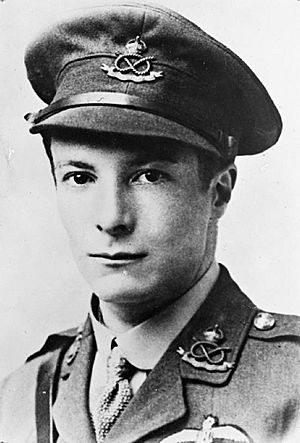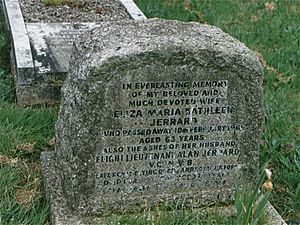Alan Jerrard facts for kids
Quick facts for kids
Alan Jerrard
|
|
|---|---|

Jerrard as an officer of the South Staffordshire Regiment
|
|
| Born | 3 December 1897 Lewisham, London |
| Died | 14 May 1968 (aged 70) Lyme Regis, Devon |
| Buried |
Exeter & Devon Crematorium
Headstone at Hillingdon Churchyard |
| Allegiance | United Kingdom |
| Service/ |
British Army Royal Air Force |
| Years of service | 1916–1933 |
| Rank | Flight Lieutenant |
| Unit | 5th South Staffordshire Regiment; No. 19 Squadron RFC; No. 66 Squadron RFC |
| Battles/wars | First World War Russian Civil War |
| Awards | Victoria Cross Mentioned in Despatches Bronze Medal of Military Valour (Italy) Order of Saint Anna, 3rd Class (Russia) |
Alan Jerrard was a very brave English pilot. He was awarded the Victoria Cross, which is the highest award for courage in battle for British and Commonwealth soldiers.
He was an officer in the British Army. When he was 20 years old, he joined the Royal Flying Corps (which later became the Royal Air Force) as a pilot during the First World War. He showed incredible bravery, earning him this special medal.
Contents
Early Life and Education
Alan Jerrard was born in Lewisham, London, in 1897. In 1902, his family moved to Sutton Coldfield. His father was the headmaster of Bishop Vesey's Grammar School for 24 years.
Alan went to Oundle School in Northamptonshire. He also studied at Birmingham University.
Flying in World War I
Jerrard volunteered to join the British Army. He first served with the South Staffordshire Regiment. In 1916, he transferred to the Royal Flying Corps to train as a fighter pilot.
In mid-1917, he flew with No. 19 Squadron in France. He was injured in a plane crash in August 1917.
From February 1918, he served with No. 66 Squadron in Italy. He flew Sopwith Camel planes. Between February and March, he shot down four enemy aircraft, including one observation balloon.
His Victoria Cross Story
Alan Jerrard received the Victoria Cross for an amazing act of bravery. This happened on March 30, 1918, near Mansuè, Italy.
- Jerrard was on patrol with two other officers.
- They shot down one of five enemy planes.
- Then, Jerrard flew very low, just 50 feet above the ground.
- He attacked an enemy airfield where about 19 planes were landing or trying to take off.
- He destroyed one of these planes.
- More enemy aircraft then attacked him.
- He saw a fellow pilot in trouble and went to help him.
- He destroyed a third enemy plane.
- He kept attacking until his patrol leader ordered him to retreat.
- Even then, with five enemy planes chasing him, he kept turning to fight them off.
- Eventually, his plane was forced down.
After the war, it was learned that Jerrard was shot down by a famous Austrian pilot named Benno Fiala von Fernbrugg. Jerrard became a prisoner of war.
He was the only pilot flying a Sopwith Camel to be awarded the Victoria Cross.
After the War
Alan Jerrard remained a prisoner until the end of 1918. He managed to escape and reach the Allied lines.
Later, he served in Russia in 1919. He achieved the rank of Flight Lieutenant in the Royal Air Force.
Alan Jerrard's Victoria Cross and his other medals are sometimes shown at the Imperial War Museum.
Images for kids
 | Audre Lorde |
 | John Berry Meachum |
 | Ferdinand Lee Barnett |



